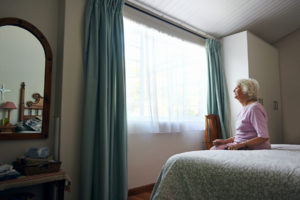
Caregivers in Cromwell CT: Sundowning and Dementia
Sundowning is a symptom associated with Alzheimer’s and other forms of dementia. Otherwise known as late-day-confusion, it refers to a person with dementia’s proclivity to become more agitated and confused later in the day at “sundown.” While it is not entirely clear what causes this unusual behavior, researchers have developed a few theories as to this common occurrence in the later stages of this disease.
Possible Causes
- The reduced lighting that occurs at sundown causes people with Alzheimer’s or another form of dementia to see shadows and shapes and mistake these for actual objects—becoming afraid or confused. Considering how dementia affects someone’s vision, this theory makes perfect sense. Vision can become very disoriented to someone with dementia. They may view the world as a series of still frames instead of a movie as most people do. They may lose depth perception, causing three-dimensional figures to appear flat. They may lose visual perception if colors are not contrasted. For instance, they may be unable to see a beige chair that is placed against a beige wall.
- They may experience changes in their circadian rhythms—the internal body clock that tells our bodies when to sleep and begin to wind-down for the day.
- Eating a large meal at this time or consuming alcohol or caffeine appears to be related to this behavior.
How to Help
As the family caregiver for your parent, you are at the frontlines—often the first to see changes in their behavior or physical abilities. By carefully observing them, you will be able to determine the little alterations in ambiance and daily occurrences that change their behavior throughout the day.
- Minimize shadows at this time of day by closing the blinds and turning on the lights prior to sundown. Make sure lights are fairly bright. Be sure to keep nightlights on in key places such as the bathroom and their bedroom. Consider installing motion sensor lighting. There is a motion sensor pad that you can place at the side of their bed. When they put their feet on it to get up, it triggers a path of small illuminated lights that have been strategically placed along the path to the bathroom and kitchen.
- An article published in Psychiatric Investigation reported studies that found light therapy to reduce agitation and confusion. To emulate this, place a full-spectrum light about three feet away from your parent for a couple of hours each morning.
- Regular routines are very important to a person whose world is changing by the minute. Stick with a light dinner prior to this time of day and then pick out a few calming activities to share together or with their care provider. This could be a nice walk around the neighborhood, a simple game that is easy for them to partake in, listening to relaxing music or reading a book. Be sure that they avoid any stimulants such as nicotine or caffeine and alcohol.
- Discourage napping and make sure their days are routine and busy, yet calm, so that nighttime finds them relaxed and sleepy.
- This can be a stressful time for the family caregiver as well as the parent. Consider obtaining the services of an in-home care provider a few days a week to provide support for the family caregiver and care for the parent.
Resources
https://www.ncbi.nlm.nih.gov/pmc/articles/PMC3246134/
If you or an aging loved-one are considering in-home caregivers in Cromwell, CT, please contact the caring staff at Franciscan Ever There Care. Call today 203-630-2881.

